综合英语(一)下册课文&翻译
- 格式:doc
- 大小:692.00 KB
- 文档页数:54
![全新版大学英语综合教程(第二版)第一册课文翻译及课后答案[1]1](https://uimg.taocdn.com/83418b1b0242a8956aece44a.webp)
Unit 1 Growing Up为自己而写——拉塞尔·贝克从孩提时代,我还住在贝尔维尔时,我的脑子里就断断续续地转着当作家的念头,但直等到我高中三年级,这一想法才有了实现的可能。
在这之前,我对所有跟英文课沾边的事都感到腻味。
我觉得英文语法枯燥难懂。
我痛恨那些长而乏味的段落写作,老师读着受累,我写着痛苦。
弗利格尔先生接我们的高三英文课时,我就准备着在这门最最单调乏味的课上再熬上沉闷的一年。
弗利格尔先生在学生中以其说话干巴和激励学生无术而出名。
据说他拘谨刻板,完全落后于时代。
我看他有六七十岁了,古板之极。
他戴着古板的毫无装饰的眼镜,微微卷曲的头发剪得笔齐,梳得纹丝不乱。
他身穿古板的套装,领带端端正正地顶着白衬衣的领扣。
他长着古板的尖下巴,古板的直鼻梁,说起话来一本正经,字斟句酌,彬彬有礼,活脱脱一个滑稽的老古董。
我作好准备,打算在弗利格尔先生的班上一无所获地混上一年,不少日子过去了,还真不出所料。
后半学期我们学写随笔小品文。
弗利格尔先生发下一张家庭作业纸,出了不少题目供我们选择。
像"暑假二三事"那样傻乎乎的题目倒是一个也没有,但绝大多数一样乏味。
我把作文题带回家,一直没写,直到要交作业的前一天晚上。
我躺在沙发上,最终不得不面对这一讨厌的功课,便从笔记本里抽出作文题目单粗粗一看。
我的目光落在"吃意大利细面条的艺术"这个题目上。
这个题目在我脑海里唤起了一连串不同寻常的图像。
贝尔维尔之夜的清晰的回忆如潮水一般涌来,当时,我们大家一起围坐在晚餐桌旁——艾伦舅舅、我母亲、查理舅舅、多丽丝、哈尔舅舅——帕特舅妈晚饭做的是意大利细面条。
那时意大利细面条还是很少听说的异国食品。
多丽丝和我都还从来没吃过,在座的大人也是经验不足,没有一个吃起来得心应手的。
艾伦舅舅家诙谐有趣的场景全都重现在我的脑海中,我回想起来,当晚我们笑作一团,争论着该如何地把面条从盘子上送到嘴里才算合乎礼仪。
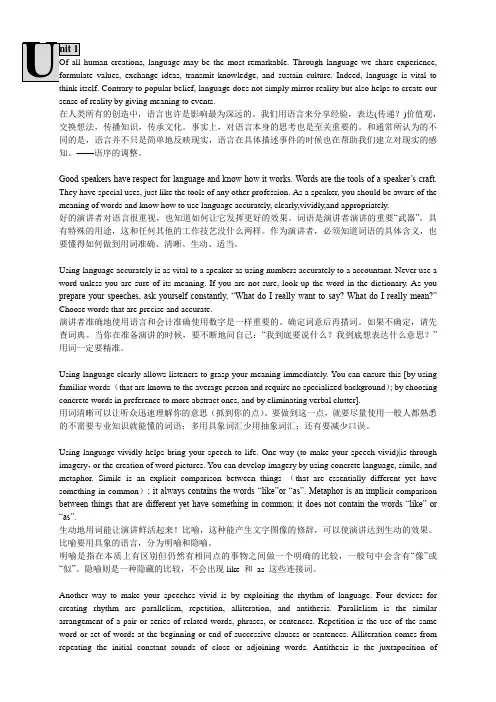
human creations, language may be the most remarkable. Through language we share experience, values, exchange ideas, transmit knowledge, and sustain culture. Indeed, language is vital tosense of reality by giving meaning to events.在人类所有的创造中,语言也许是影响最为深远的。
我们用语言来分享经验,表达(传递?)价值观,交换想法,传播知识,传承文化。
事实上,对语言本身的思考也是至关重要的。
和通常所认为的不同的是,语言并不只是简单地反映现实,语言在具体描述事件的时候也在帮助我们建立对现实的感知。
——语序的调整。
Good speakers have respect for language and know how it works. Words are the tools of a speaker’s craft. They have special uses, just like the tools of any other profession. As a speaker, you should be aware of the meaning of words and know how to use language accurately, clearly,vividly,and appropriately.好的演讲者对语言很重视,也知道如何让它发挥更好的效果。
词语是演讲者演讲的重要“武器”,具有特殊的用途,这和任何其他的工作技艺没什么两样。
作为演讲者,必须知道词语的具体含义,也要懂得如何做到用词准确、清晰、生动、适当。
Using language accurately is as vital to a speaker as using numbers accurately to a accountant. Never use a word unless you are sure of its meaning. If you are not sure, look up the word in the dictionary. As you prepare your speeches, ask yourself constantly, “What do I really want to say? What do I really mean?” Choose words that are precise and accurate.演讲者准确地使用语言和会计准确使用数字是一样重要的。
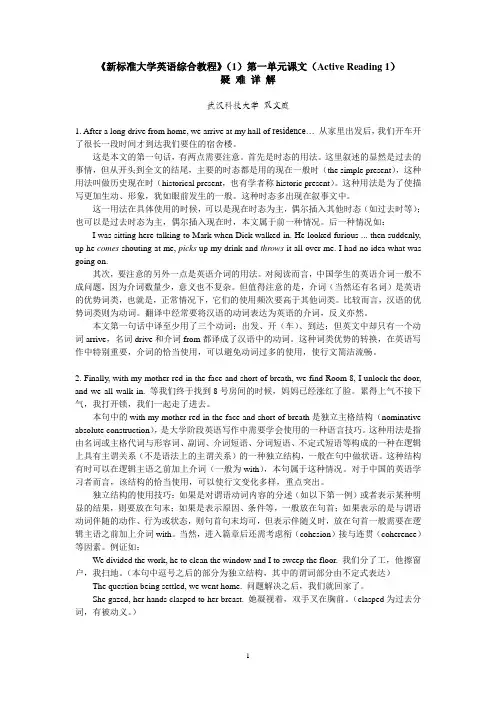
《新标准大学英语综合教程》(1)第一单元课文(Active Reading 1)疑难详解武汉科技大学双文庭1. After a long drive from home, we arrive at my hall of residence…从家里出发后,我们开车开了很长一段时间才到达我们要住的宿舍楼。
这是本文的第一句话,有两点需要注意。
首先是时态的用法。
这里叙述的显然是过去的事情,但从开头到全文的结尾,主要的时态都是用的现在一般时(the simple present),这种用法叫做历史现在时(historical present,也有学者称historic present)。
这种用法是为了使描写更加生动、形象,犹如眼前发生的一般。
这种时态多出现在叙事文中。
这一用法在具体使用的时候,可以是现在时态为主,偶尔插入其他时态(如过去时等);也可以是过去时态为主,偶尔插入现在时,本文属于前一种情况。
后一种情况如:I was sitting here talking to Mark when Dick walked in. He looked furious ... then suddenly, up he comes shouting at me, picks up my drink and throws it all over me. I had no idea what was going on.其次,要注意的另外一点是英语介词的用法。
对阅读而言,中国学生的英语介词一般不成问题,因为介词数量少,意义也不复杂。
但值得注意的是,介词(当然还有名词)是英语的优势词类,也就是,正常情况下,它们的使用频次要高于其他词类。
比较而言,汉语的优势词类则为动词。
翻译中经常要将汉语的动词表达为英语的介词,反义亦然。
本文第一句话中译至少用了三个动词:出发、开(车)、到达;但英文中却只有一个动词arrive,名词drive和介词from都译成了汉语中的动词。
![全新版大学英语综合教程(第二版)第一册_课文翻译与课后答案[1]](https://uimg.taocdn.com/0f4ac8f7e53a580216fcfecb.webp)
Unit 1 Growing Up为自己而写——拉塞尔·贝克从孩提时代,我还住在贝尔维尔时,我的脑子里就断断续续地转着当作家的念头,但直等到我高中三年级,这一想法才有了实现的可能。
在这之前,我对所有跟英文课沾边的事都感到腻味。
我觉得英文语法枯燥难懂。
我痛恨那些长而乏味的段落写作,老师读着受累,我写着痛苦。
弗利格尔先生接我们的高三英文课时,我就准备着在这门最最单调乏味的课上再熬上沉闷的一年。
弗利格尔先生在学生中以其说话干巴和激励学生无术而出名。
据说他拘谨刻板,完全落后于时代。
我看他有六七十岁了,古板之极。
他戴着古板的毫无装饰的眼镜,微微卷曲的头发剪得笔齐,梳得纹丝不乱。
他身穿古板的套装,领带端端正正地顶着白衬衣的领扣。
他长着古板的尖下巴,古板的直鼻梁,说起话来一本正经,字斟句酌,彬彬有礼,活脱脱一个滑稽的老古董。
我作好准备,打算在弗利格尔先生的班上一无所获地混上一年,不少日子过去了,还真不出所料。
后半学期我们学写随笔小品文。
弗利格尔先生发下一张家庭作业纸,出了不少题目供我们选择。
像"暑假二三事"那样傻乎乎的题目倒是一个也没有,但绝大多数一样乏味。
我把作文题带回家,一直没写,直到要交作业的前一天晚上。
我躺在沙发上,最终不得不面对这一讨厌的功课,便从笔记本里抽出作文题目单粗粗一看。
我的目光落在"吃意大利细面条的艺术"这个题目上。
这个题目在我脑海里唤起了一连串不同寻常的图像。
贝尔维尔之夜的清晰的回忆如潮水一般涌来,当时,我们大家一起围坐在晚餐桌旁——艾伦舅舅、我母亲、查理舅舅、多丽丝、哈尔舅舅——帕特舅妈晚饭做的是意大利细面条。
那时意大利细面条还是很少听说的异国食品。
多丽丝和我都还从来没吃过,在座的大人也是经验不足,没有一个吃起来得心应手的。
艾伦舅舅家诙谐有趣的场景全都重现在我的脑海中,我回想起来,当晚我们笑作一团,争论着该如何地把面条从盘子上送到嘴里才算合乎礼仪。
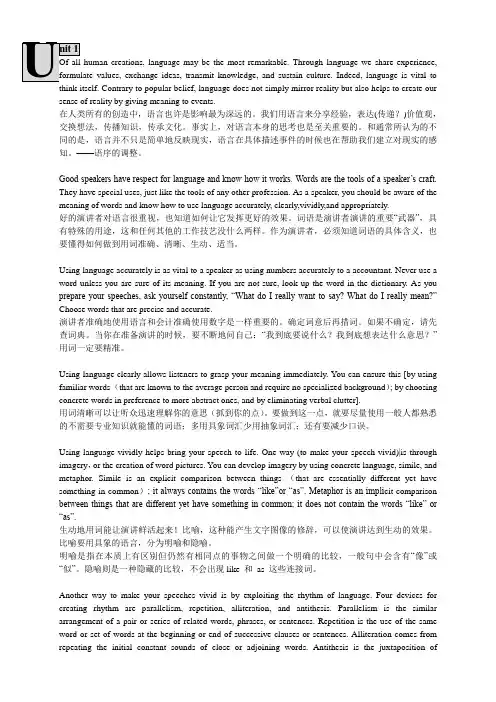
human creations, language may be the most remarkable. Through language we share experience, values, exchange ideas, transmit knowledge, and sustain culture. Indeed, language is vital tosense of reality by giving meaning to events.在人类所有的创造中,语言也许是影响最为深远的。
我们用语言来分享经验,表达(传递?)价值观,交换想法,传播知识,传承文化。
事实上,对语言本身的思考也是至关重要的。
和通常所认为的不同的是,语言并不只是简单地反映现实,语言在具体描述事件的时候也在帮助我们建立对现实的感知。
——语序的调整。
Good speakers have respect for language and know how it works. Words are the tools of a speaker‟s craft. They have special uses, just like the tools of any other profession. As a speaker, you should be aware of the meaning of words and know how to use language accurately, clearly,vividly,and appropriately.好的演讲者对语言很重视,也知道如何让它发挥更好的效果。
词语是演讲者演讲的重要“武器”,具有特殊的用途,这和任何其他的工作技艺没什么两样。
作为演讲者,必须知道词语的具体含义,也要懂得如何做到用词准确、清晰、生动、适当。
Using language accurately is as vital to a speaker as using numbers accurately to a accountant. Never use a word unless you are sure of its meaning. If you are not sure, look up the word in the dictionary. As you prepare your speeches, ask yourself constantly, “What do I really want to say? What do I really mean?” Choose words that are precise and accurate.演讲者准确地使用语言和会计准确使用数字是一样重要的。
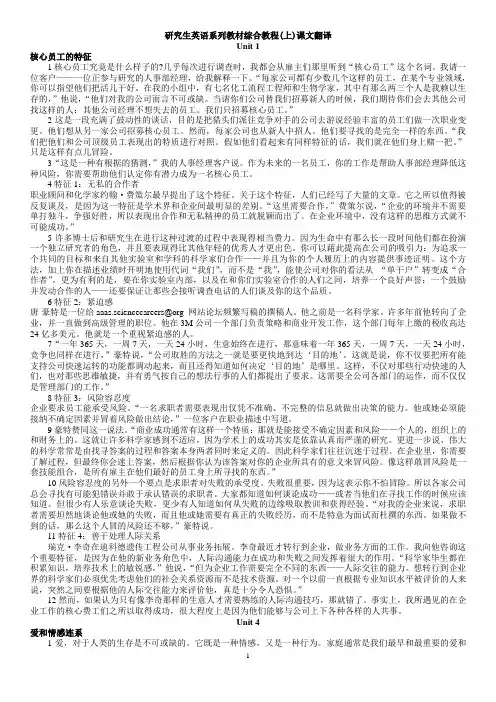
研究生英语系列教材综合教程(上)课文翻译Unit 1核心员工的特征1核心员工究竟是什么样子的?几乎每次进行调查时,我都会从雇主们那里听到“核心员工”这个名词。
我请一位客户——一位正参与研究的人事部经理,给我解释一下。
“每家公司都有少数几个这样的员工,在某个专业领域,你可以指望他们把活儿干好。
在我的小组中,有七名化工流程工程师和生物学家,其中有那么两三个人是我赖以生存的,”他说,“他们对我的公司而言不可或缺。
当请你们公司替我们招募新人的时候,我们期待你们会去其他公司找这样的人:其他公司经理不想失去的员工。
我们只招募核心员工。
”2这是一段充满了鼓动性的谈话,目的是把猎头们派往竞争对手的公司去游说经验丰富的员工们做一次职业变更。
他们想从另一家公司招募核心员工。
然而,每家公司也从新人中招人。
他们要寻找的是完全一样的东西。
“我们把他们和公司顶级员工表现出的特质进行对照。
假如他们看起来有同样特征的话,我们就在他们身上赌一把。
”只是这样有点儿冒险。
3“这是一种有根据的猜测,”我的人事经理客户说。
作为未来的一名员工,你的工作是帮助人事部经理降低这种风险,你需要帮助他们认定你有潜力成为一名核心员工。
4特征1:无私的合作者职业顾问和化学家约翰·费策尔最早提出了这个特征。
关于这个特征,人们已经写了大量的文章。
它之所以值得被反复谈及,是因为这一特征是学术界和企业间最明显的差别。
“这里需要合作,”费策尔说,“企业的环境并不需要单打独斗,争强好胜,所以表现出合作和无私精神的员工就脱颖而出了。
在企业环境中,没有这样的思维方式就不可能成功。
”5许多博士后和研究生在进行这种过渡的过程中表现得相当费力。
因为生命中有那么长一段时间他们都在扮演一个独立研究者的角色,并且要表现得比其他年轻的优秀人才更出色。
你可以藉此提高在公司的吸引力:为追求一个共同的目标和来自其他实验室和学科的科学家们合作——并且为你的个人履历上的内容提供事迹证明。
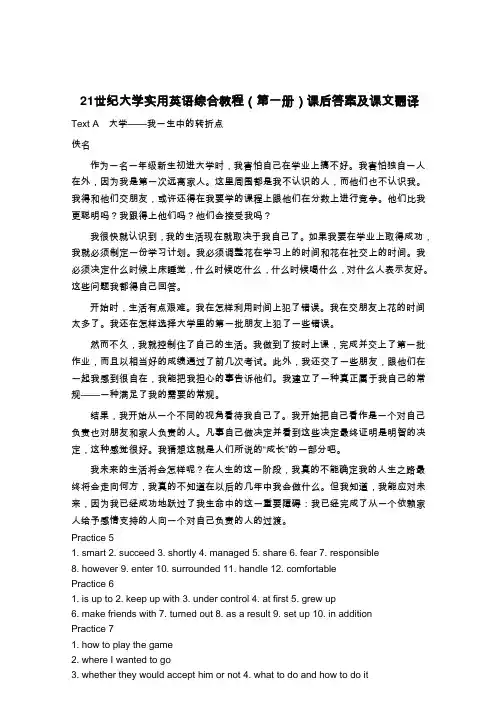
21世纪大学实用英语综合教程(第一册)课后答案及课文翻译Text A 大学——我一生中的转折点佚名作为一名一年级新生初进大学时,我害怕自己在学业上搞不好。
我害怕独自一人在外,因为我是第一次远离家人。
这里周围都是我不认识的人,而他们也不认识我。
我得和他们交朋友,或许还得在我要学的课程上跟他们在分数上进行竞争。
他们比我更聪明吗?我跟得上他们吗?他们会接受我吗?我很快就认识到,我的生活现在就取决于我自己了。
如果我要在学业上取得成功,我就必须制定一份学习计划。
我必须调整花在学习上的时间和花在社交上的时间。
我必须决定什么时候上床睡觉,什么时候吃什么,什么时候喝什么,对什么人表示友好。
这些问题我都得自己回答。
开始时,生活有点艰难。
我在怎样利用时间上犯了错误。
我在交朋友上花的时间太多了。
我还在怎样选择大学里的第一批朋友上犯了一些错误。
然而不久,我就控制住了自己的生活。
我做到了按时上课,完成并交上了第一批作业,而且以相当好的成绩通过了前几次考试。
此外,我还交了一些朋友,跟他们在一起我感到很自在,我能把我担心的事告诉他们。
我建立了一种真正属于我自己的常规——一种满足了我的需要的常规。
结果,我开始从一个不同的视角看待我自己了。
我开始把自己看作是一个对自己负责也对朋友和家人负责的人。
凡事自己做决定并看到这些决定最终证明是明智的决定,这种感觉很好。
我猜想这就是人们所说的“成长”的一部分吧。
我未来的生活将会怎样呢?在人生的这一阶段,我真的不能确定我的人生之路最终将会走向何方,我真的不知道在以后的几年中我会做什么。
但我知道,我能应对未来,因为我已经成功地跃过了我生命中的这一重要障碍:我已经完成了从一个依赖家人给予感情支持的人向一个对自己负责的人的过渡。
Practice 51. smart2. succeed3. shortly4. managed5. share6. fear7. responsible8. however 9. enter 10. surrounded 11. handle 12. comfortablePractice 61. is up to2. keep up with3. under control4. at first5. grew up6. make friends with7. turned out8. as a result9. set up 10. in additionPractice 71. how to play the game2. where I wanted to go3. whether they would accept him or not4. what to do and how to do it5. whom to love and whom not to6. when he made that decisionPractice 8I see Li Ming as my best friend. We share the same hobbies and interests.They looked upon their math teacher as their best teacher.We think of this place as our home.They looked on their college life as their happiest years in their life.Practice 91. John is both smart and responsible. He likes to make friends with other people.2. I have made the decision to compete for the new post. You can compete for it, too.3. Shortly after the doctor came, he managed to have my father ’s illness under control.4. As freshmen, most of us do not know what college life has in store for us, but we all know that we must do well in our studies.5. To succeed in college, we must keep up with the other students and set up a routine that meets out needs.6. Though the assignments last week turned out to be more difficult than I thought, I handed them in on time.Text B 我希望从大学教育中得到什么亚历克西斯.沃尔顿中学毕业后,我计划做几件事。
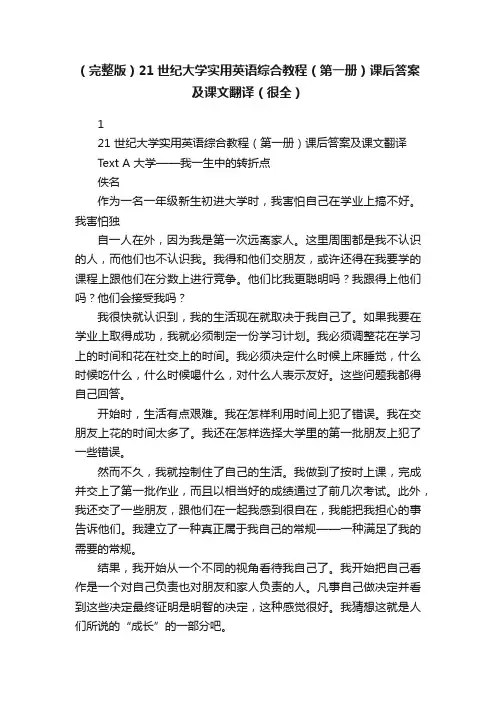
(完整版)21世纪大学实用英语综合教程(第一册)课后答案及课文翻译(很全)121 世纪大学实用英语综合教程(第一册)课后答案及课文翻译Text A 大学——我一生中的转折点佚名作为一名一年级新生初进大学时,我害怕自己在学业上搞不好。
我害怕独自一人在外,因为我是第一次远离家人。
这里周围都是我不认识的人,而他们也不认识我。
我得和他们交朋友,或许还得在我要学的课程上跟他们在分数上进行竞争。
他们比我更聪明吗?我跟得上他们吗?他们会接受我吗?我很快就认识到,我的生活现在就取决于我自己了。
如果我要在学业上取得成功,我就必须制定一份学习计划。
我必须调整花在学习上的时间和花在社交上的时间。
我必须决定什么时候上床睡觉,什么时候吃什么,什么时候喝什么,对什么人表示友好。
这些问题我都得自己回答。
开始时,生活有点艰难。
我在怎样利用时间上犯了错误。
我在交朋友上花的时间太多了。
我还在怎样选择大学里的第一批朋友上犯了一些错误。
然而不久,我就控制住了自己的生活。
我做到了按时上课,完成并交上了第一批作业,而且以相当好的成绩通过了前几次考试。
此外,我还交了一些朋友,跟他们在一起我感到很自在,我能把我担心的事告诉他们。
我建立了一种真正属于我自己的常规——一种满足了我的需要的常规。
结果,我开始从一个不同的视角看待我自己了。
我开始把自己看作是一个对自己负责也对朋友和家人负责的人。
凡事自己做决定并看到这些决定最终证明是明智的决定,这种感觉很好。
我猜想这就是人们所说的“成长”的一部分吧。
我未来的生活将会怎样呢?在人生的这一阶段,我真的不能确定我的人生之路最终将会走向何方,我真的不知道在以后的几年中我会做什么。
但我知道,我能应对未来,因为我已经成功地跃过了我生命中的这一重要障碍:我已经完成了从一个依赖家人给予感情支持的人向一个对自己负责的人的过渡。
第二单元他帮助了盲人珍妮?K?格里泽眼睛瞎了而又想读书——这就是路易?布莱叶的生活现实。
想顺利进行阅读的愿望导致了布莱叶盲字体系的产生。
![复旦大学出版社。研究生综合英语①修订版(课后习题解答+课文翻译)[1]](https://uimg.taocdn.com/8035e1c50c22590102029d3e.webp)
Unit One An Image or a MirageIII. VocabularyA.1. unassuming2. stemmed from3. infallible4. had taken to5. prospect6. flabby7. More often than not8.devious9. tipped the scales in her favor 10. rapportB.1. instinctual2.immediate3. deposit4. frail5. seedy6. magnetic7. extroverted8. book9. unwarranted 10. refinedC.1. D2.C3. B4. A5. A6. C7. C8.B9. D 10.BIV. Cloze1. which2. run3. concerned4. familiar5. evident6. even7.what8.Consequently 9 knowing 10.By 11. one 12. how 13. Once 14. obtainable 15. yourself 16. mind 17. from 18. never 19. pays 20. considered V. TranslationA.从更大的范围上讲,选民们往往仅因为某个政客的外表整洁清秀而对他做出有利的反应。
他的对手则因为没有生就一副令人信任的外表而常常遭到否定的评价。
这种判断是错误的,其后果可能是灾难性的。
就算许多选民投一位候选人的票完全是出于政治原因,但本不该当选的人,如果他有整洁清秀的形象,就会使他在势均力敌的选举中占有优势。
我们常常根据一个人的表达能力而做出轻率的判断。
再回到政治这一话题上来,许多选民仅仅根据候选人公开演讲的方式就对他的能力做出判断。
然而,一个候选人可能非常善于演说,但并不一定能胜任他所竞选的职位。
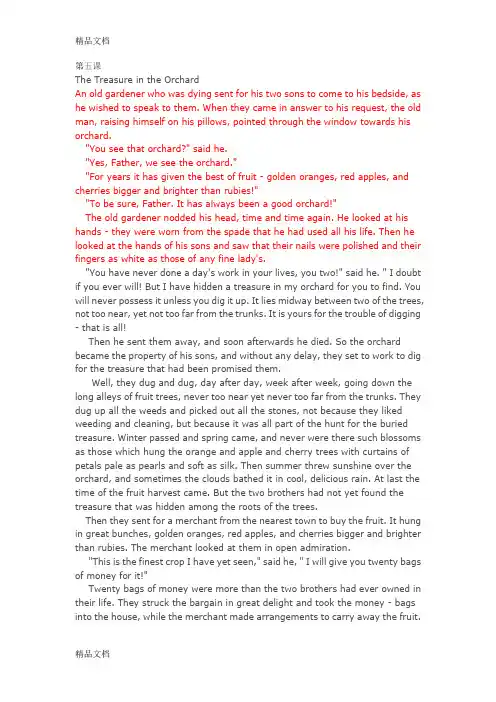
第五课The Treasure in the OrchardAn old gardener who was dying sent for his two sons to come to his bedside, as he wished to speak to them. When they came in answer to his request, the old man, raising himself on his pillows, pointed through the window towards his orchard."You see that orchard?" said he."Yes, Father, we see the orchard.""For years it has given the best of fruit - golden oranges, red apples, and cherries bigger and brighter than rubies!""To be sure, Father. It has always been a good orchard!"The old gardener nodded his head, time and time again. He looked at his hands - they were worn from the spade that he had used all his life. Then he looked at the hands of his sons and saw that their nails were polished and their fingers as white as those of any fine lady's."You have never done a day's work in your lives, you two!" said he. " I doubt if you ever will! But I have hidden a treasure in my orchard for you to find. You will never possess it unless you dig it up. It lies midway between two of the trees, not too near, yet not too far from the trunks. It is yours for the trouble of digging - that is all!Then he sent them away, and soon afterwards he died. So the orchard became the property of his sons, and without any delay, they set to work to dig for the treasure that had been promised them.Well, they dug and dug, day after day, week after week, going down the long alleys of fruit trees, never too near yet never too far from the trunks. They dug up all the weeds and picked out all the stones, not because they liked weeding and cleaning, but because it was all part of the hunt for the buried treasure. Winter passed and spring came, and never were there such blossoms as those which hung the orange and apple and cherry trees with curtains of petals pale as pearls and soft as silk. Then summer threw sunshine over the orchard, and sometimes the clouds bathed it in cool, delicious rain. At last the time of the fruit harvest came. But the two brothers had not yet found the treasure that was hidden among the roots of the trees.Then they sent for a merchant from the nearest town to buy the fruit. It hung in great bunches, golden oranges, red apples, and cherries bigger and brighter than rubies. The merchant looked at them in open admiration."This is the finest crop I have yet seen," said he, " I will give you twenty bags of money for it!"Twenty bags of money were more than the two brothers had ever owned in their life. They struck the bargain in great delight and took the money - bags into the house, while the merchant made arrangements to carry away the fruit."I will come again next year," said he, " I am always glad to buy crop like this. How you must have dug and weeded and worked to get it!"He went away, and the brothers sat eyeing each other over the tops of the money-bags. Their hands were rough and toil-worn, just as the old gardener's had been when he died."Golden oranges and red apples and cherries bigger and brighterthan rubies," said one of them, softly." I believe that this is the treasure we have been digging for all year, the very treasure our father meant!"一个老园丁快死了,叫人把两个儿子叫到床边来,因为他想要对他们说话。
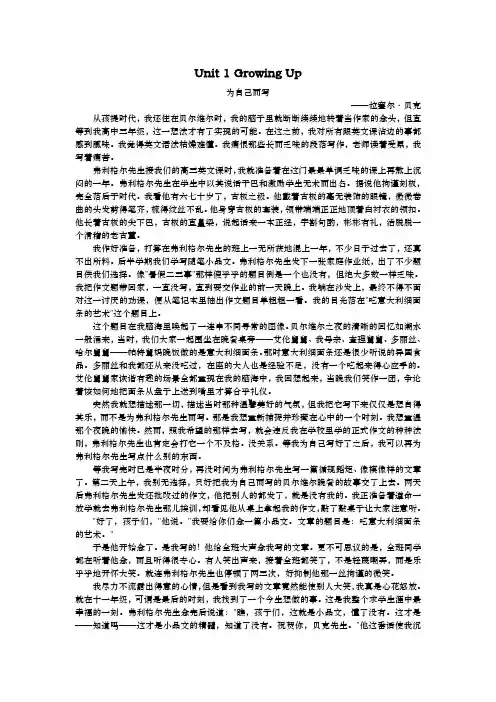
Unit 1 Growing Up为自己而写——拉塞尔·贝克从孩提时代,我还住在贝尔维尔时,我的脑子里就断断续续地转着当作家的念头,但直等到我高中三年级,这一想法才有了实现的可能。
在这之前,我对所有跟英文课沾边的事都感到腻味。
我觉得英文语法枯燥难懂。
我痛恨那些长而乏味的段落写作,老师读着受累,我写着痛苦。
弗利格尔先生接我们的高三英文课时,我就准备着在这门最最单调乏味的课上再熬上沉闷的一年。
弗利格尔先生在学生中以其说话干巴和激励学生无术而出名。
据说他拘谨刻板,完全落后于时代。
我看他有六七十岁了,古板之极。
他戴着古板的毫无装饰的眼镜,微微卷曲的头发剪得笔齐,梳得纹丝不乱。
他身穿古板的套装,领带端端正正地顶着白衬衣的领扣。
他长着古板的尖下巴,古板的直鼻梁,说起话来一本正经,字斟句酌,彬彬有礼,活脱脱一个滑稽的老古董。
我作好准备,打算在弗利格尔先生的班上一无所获地混上一年,不少日子过去了,还真不出所料。
后半学期我们学写随笔小品文。
弗利格尔先生发下一张家庭作业纸,出了不少题目供我们选择。
像"暑假二三事"那样傻乎乎的题目倒是一个也没有,但绝大多数一样乏味。
我把作文题带回家,一直没写,直到要交作业的前一天晚上。
我躺在沙发上,最终不得不面对这一讨厌的功课,便从笔记本里抽出作文题目单粗粗一看。
我的目光落在"吃意大利细面条的艺术"这个题目上。
这个题目在我脑海里唤起了一连串不同寻常的图像。
贝尔维尔之夜的清晰的回忆如潮水一般涌来,当时,我们大家一起围坐在晚餐桌旁——艾伦舅舅、我母亲、查理舅舅、多丽丝、哈尔舅舅——帕特舅妈晚饭做的是意大利细面条。
那时意大利细面条还是很少听说的异国食品。
多丽丝和我都还从来没吃过,在座的大人也是经验不足,没有一个吃起来得心应手的。
艾伦舅舅家诙谐有趣的场景全都重现在我的脑海中,我回想起来,当晚我们笑作一团,争论着该如何地把面条从盘子上送到嘴里才算合乎礼仪。
AppendixⅡChinese Translations of Text B (Units 1-8)第一单元成长课文B夏天打工时,作者常常替巴卢先生修剪草坪。
惟一的问题是,巴卢先生似乎从来没钱支付工钱。
然而,他实际上所给予的却远比工钱珍贵。
夏日阅读迈克尔·多里斯十四岁那年,我在暑假里替人修剪草坪挣些钱,不出几个星期,我就有了不少客户。
客户们种植的花卉我得记住不能剪去,他们会将东西遗落在草地上或故意插在地里,通过这些我逐渐认识了他们。
我对大多数客户了解至深,事先就能知道他们会抱怨些什么,哪些特别的要求不能掉以轻心。
(1)而且,我从邻居偏爱的付款方式中了解到了一点他们的情况:有的按干的活儿给钱,有的按月支付——或者有的压根儿不付钱。
巴卢先生属于最后一类,而且他总有理由。
有一天他兑不开一张五十元的钞票,又有一天他支票用完了,还有一天我上门时他干脆就溜出去了。
撇开钱这档子事,他倒也还是个挺不错的老头,每次看见我,老远就挥手或脱帽致意。
我猜他退休金不多,可能出过工伤,整不了自己的园子。
没错,我全都记着帐,可我对这点钱并没太在意。
(2)也就是剪剪草,何况巴卢先生住宅外面的那一点草坪修剪起来花不了多少时间。
到了一年中最热的七月中旬,一天傍晚前,我走过他家,他开了门,示意我进去。
门厅里凉凉的,帘子遮去了阳光,过了一会儿我的眼睛才适应室内的暗淡光线。
“我欠你工钱,”巴卢先生开口道,“不过……”我想省得他费神找新的借口了,就说,“没事。
别放在心上。
”“银行把我的账弄错了,”他没理我的碴儿,接着说。
“一两天里就会改过来。
在这当儿,我想你不妨挑——两本书作为我的首付款。
”他朝墙那边指了指,我这才发现到处都堆着书。
就跟图书馆一样,只不过没有分门别类罢了。
“别着急,”巴卢先生鼓动说。
“读也好,借也好,留着也行。
找你喜欢的。
你平常都爱读什么书啊?”“我不知道。
”我的确不知道。
我通常是弄到什么就读什么,从药房里买到的平装书,图书馆里借得到的书、杂志,到麦片包装盒背面的说明,还有连环漫画,什么都看。
21世纪大学实用英语综合教程(第一册)5,6,7课文及其翻译The Treasure in the OrchardAn old gardener who was dying sent for his two sons to come to his bedside, as he wished to speak to them. When they came in answer to his request, the old man, raising himself on his pillows, pointed through the window towards his orchard.“You se e that orchard?" said he."Yes, Father, we see the orchard.""For years it has given the best of fruit - golden oranges, red apples, and cherries bigger and brighter than rubies!""To be sure, Father. It has always been a good orchard!"The old gardener nodded his head, time and time again. He looked at his hands - they were worn from the spade that he had used all his life. Then he looked at the hands of his sons and saw that their nails were polished and their fingers as white as those of any fine lady's."You have never done a day's work in your lives, you two!" said he. " I doubt if you ever will! But I have hidden a treasure inmy orchard for you to find. You will never possess it unless you dig it up. It lies midway between two of the trees, not too near, yet not too far from the trunks. It is yours for the trouble of digging - that is all!Then he sent them away, and soon afterwards he died. So the orchardbecame the property of his sons, and without any delay, they set to work to dig for the treasure that had been promised them.Well, they dug and dug, day after day, week after week, going down the long alleys of fruit trees, never too near yet never too far from the trunks. They dug up all the weeds and picked out all the stones, not because they liked weeding and cleaning, but because it was all part of the hunt for the buried treasure. Winter passed and spring came, and never were there such blossoms as those which hung the orange and apple and cherry trees with curtains of petals pale as pearls and soft as silk. Then summer threw sunshine over the orchard, and sometimes the clouds bathed it in cool, delicious rain. At last the time of the fruit harvest came. But the two brothers had not yet found the treasure that was hidden among the roots of the trees.Then they sent for a merchant from the nearest town to buythe fruit. It hung in great bunches, golden oranges, red apples, and cherries bigger and brighter than rubies. The merchant looked at them in open admiration."This is the finest crop I have yet seen," said he, " I will give you twenty bags of money for it!"Twenty bags of money were more than the two brothers had ever owned in their life. They struck the bargain in great delight and took the money - bags into the house, while the merchant made arrangements to carry away the fruit.UNIT5 Treasure in the OrchardUNIT6 Tracking Down My DreamUNIT7 The Smile"I will come again next year," said he, " I am always glad to buy crop like this. How you must have dug and weeded and worked to get it!"He went away, and the brothers sat eyeing each other over the tops of the money-bags. Their hands were rough and toil-worn, just as the old gardener's had been when he died."Golden oranges and red apples and cherries bigger and brighterthan rubies," said one of them, softly." I believe that this is the treasure we have been digging for all year, the very treasureour father meant!"一个老园丁快死了,叫人把两个儿子叫到床边来,因为他想要对他们说话。
Ⅰ.Vocabulary1\Alan was always in trouble with the police when he was young but he’s now a respectable married man.2\The people who had been hurt in the car accident lay screaming in agony.在交通事故中受伤的人正躺在地上痛哭的哭叫。
3\Because his condition’s not serious they’v e put his name down on the hospital waiting list因为他的病情并不严重,他们已经把他的名字写在医院的等候名单4\the second part of the book deseribes the strange sequence of events that lead to the King’s fall from power.本书的第二部分介绍了一连串奇怪的事件,导致国王下台的。
5\when I saw my little boy crying bitterly over the death of his pet dog,I could hardly hold back my tears.当我看到我的小男孩的痛苦哭泣超过他的宠物狗的死亡,我几乎控制不住我的眼泪。
6\thery are going to distribute t hose clothes and blan-kets among the flood victims.他们将要分发这些衣服和blan-kets给洪水灾民。
7\lind manage to support herself by working off and on as a waitress.林德管理是不时当服务员来支持自己的工作,。
Unit 1Creating a Low-Carbon Economy创建低碳生活Overview概述1.There is no longer any real question that global warming is occurring as the result of therapid build-up of greenhouse gases primarily caused by human activities. We are on a trajectory for global warming to become much more intense unless we begin a concerted, rapid shift toward a low-carbon economy. And the danger is increasingly clear and present.As Rajendra Pachauri, chairman of the Intergovernmental Panel on Climate Change and recipient of the 2007 Nobel Peace Prize, has said, “If there’s no action before 2012, that’s too late. What we do in the next two to three years will determine our future. This is the defining moment.”对于主要由人类活动而迅速积累的温室气体引发了全球变暖这一事实,没有人再持有异议。
除非我们协同一致,快速转向低碳经济,否则全球变暖的趋势将会愈演愈烈。
这一危机日益彰显逼近。
正如获得2007年诺贝尔和平奖的联合国政府间气候变化专门委员会(IPCC)主席拉金德拉·帕乔里所声称的:“如果在2012年之前我们还没有采取行动,那就为时已晚了。
Unit 1 Growing Up为自己而写——拉塞尔·贝克从孩提时代,我还住在贝尔维尔时,我的脑子里就断断续续地转着当作家的念头,但直等到我高中三年级,这一想法才有了实现的可能。
在这之前,我对所有跟英文课沾边的事都感到腻味。
我觉得英文语法枯燥难懂。
我痛恨那些长而乏味的段落写作,老师读着受累,我写着痛苦。
弗利格尔先生接我们的高三英文课时,我就准备着在这门最最单调乏味的课上再熬上沉闷的一年。
弗利格尔先生在学生中以其说话干巴和激励学生无术而出名。
据说他拘谨刻板,完全落后于时代。
我看他有六七十岁了,古板之极。
他戴着古板的毫无装饰的眼镜,微微卷曲的头发剪得笔齐,梳得纹丝不乱。
他身穿古板的套装,领带端端正正地顶着白衬衣的领扣。
他长着古板的尖下巴,古板的直鼻梁,说起话来一本正经,字斟句酌,彬彬有礼,活脱脱一个滑稽的老古董。
我作好准备,打算在弗利格尔先生的班上一无所获地混上一年,不少日子过去了,还真不出所料。
后半学期我们学写随笔小品文。
弗利格尔先生发下一张家庭作业纸,出了不少题目供我们选择。
像"暑假二三事"那样傻乎乎的题目倒是一个也没有,但绝大多数一样乏味。
我把作文题带回家,一直没写,直到要交作业的前一天晚上。
我躺在沙发上,最终不得不面对这一讨厌的功课,便从笔记本里抽出作文题目单粗粗一看。
我的目光落在"吃意大利细面条的艺术"这个题目上。
这个题目在我脑海里唤起了一连串不同寻常的图像。
贝尔维尔之夜的清晰的回忆如潮水一般涌来,当时,我们大家一起围坐在晚餐桌旁——艾伦舅舅、我母亲、查理舅舅、多丽丝、哈尔舅舅——帕特舅妈晚饭做的是意大利细面条。
那时意大利细面条还是很少听说的异国食品。
多丽丝和我都还从来没吃过,在座的大人也是经验不足,没有一个吃起来得心应手的。
艾伦舅舅家诙谐有趣的场景全都重现在我的脑海中,我回想起来,当晚我们笑作一团,争论着该如何地把面条从盘子上送到嘴里才算合乎礼仪。
Unit 1一、词汇短语In-Class ReadingThe Gift of Lifebomb [] n. 炸弹;原子弹;快速行驶vt. 投弹于,轰炸vi. 轰炸,投弹;失败【例句】Her new play bombed after only three nights. 她的新戏只演出三晚就演不下去。
【助记】炸弹的爆炸声而造出bomb 炸弹be supposed to应该;被期望【例句】You were supposed to be here an hour ago. 你应该在一小时之前赶到这里。
orphanage [] n. 孤儿院;孤儿身份【例句】I founded an orphanage last year and feel obliged to take care of those children.去年我创办了一个孤儿院。
我觉得有责任去照顾那些小孩。
missionary [] adj. 传教(士)的,教会的n. 传教士;倡导者,鼓吹者【例句】St. John Rivers asks Jane to be his wife and to go with him to India where he plans to become a missionary.圣约翰·里弗斯要求简做他的妻子,与他同去印度,他打算在那里当个传教士。
【助记】mission(务)+aryinclude [] vt. 包括,包含;计入【例句】He had included a large number of funny stories in the speech. 他在讲话中加进了许多引人发笑的故事。
【助记】in(向内)+clud(关)+e→关在里面→包括,包含suffer [] v. 受苦,受难;遭受,经历;忍受【例句】The new plant can’t suffer the cold weather. 这种新植物不耐寒。
综合英语(一)下Lesson OneThe Story of an HourKate ChopinLearning Guide一位已婚女士闻其丈夫惨死于火车事故,不顾自己衰弱的心脏能否经受得住,当即入放声痛哭,随后又不顾亲友的劝告将自己锁在屋内。
她推开窗子,迎来外面雨后的一片春意盎然。
那充满生机的景象突然唤醒了长期隐藏在她心底深处的愿望,她感到了身心从未有过的自由。
正当她憧憬着未来的自由时……1They knew that Louise Mallard had a weak heart. So they broke the bad news gently. Her husband, Brently, was dead.他们知道路易丝·马拉德的心脏不太好,所以把坏消息告诉她时非常小心。
她的丈夫布伦特里死了。
2“There was a train accident, Louise,” said her sister Josephine, quietly.3Her husband's friend, Richards, brought the news, but Josephine told the story. She spoke in broken sentences.4“Richards… was at the newspaper office. News of the accident came. Louise… Louise, Brently's name was on the list. Brently…was killed, Louise.”“出了一次火车事故,路易丝。
”姐姐约瑟芬轻声说道。
带来消息的是她丈夫的朋友理查兹,但告诉她的是约瑟芬。
约瑟芬在讲述时语不成句。
“理查兹当时正在报社,消息传了过来。
路易丝……路易丝,死者的名单上有布伦特里的名字。
布伦特里……遇难了,路易丝。
”5Louise did not hear the story calmly, like some women would.She could not close her mind or her heart to the news. Like a sudden storm, her tears broke out. She cried, at once, loudly in her sister's arms. Then, just as suddenly, the tears stopped. She went to her room alone. She would not let anyone follow her.路易丝听到这个噩耗,没有像有些妇女所可能表现的那样平静。
她不可能做到无动于衷。
泪水像突如其来的暴雨,夺眶而出。
她立时呼号起来,在姐姐的怀里放声大哭。
随后她的泪水就像它们突然来时的那样又突然止住了。
她独自走进自己的房间,不让任何人跟着进去。
6In front of the window stood a large, comfortable armchair. Into this she sank and looked out of the window. She was physically exhausted after her tears. Her body felt cold; her mind and heart were empty.7Outside her window she could see the trees. The air smelled like spring rain. She could hear someone singing far away. Birds sang near the house. Blue sky showed between the clouds. She rested.窗前放着一把又大又舒适的扶手椅。
她疲惫地坐到椅子上,向窗外望去。
哭过之后,她筋疲力尽。
她浑身冰凉,脑子里和心里一片空白。
窗外,她能看到一片树木,空气闻起来就像春雨过后。
她还能听到远处有人在唱歌,房子附近也有鸟儿在歌唱,白云间露出一片片蓝天。
她平静了下来。
8She sat quietly, but a few weak tears still fell. She was young, with a fair, calm face that showed a certain strength. But now there was a dull stare in her eyes. She looked out of the window at the blue sky. She was not thinking, or seeing. She was waiting.她静静地坐着,又有几滴泪水掉落下来。
她很年轻,白皙安详的脸上显露出一种毅力。
但此时此刻,她的眼神中没有一丝生气。
她望着窗外的蓝天。
她不是在想,也不是在看,而是在等待。
9There was something coming to her and she was waiting for it with fear. What was it? She did not know. It was too subtle to name. But she felt it creeping out of the sky. It was reaching her through the sound, the smell, the color that filled the air.什么东西正向她靠近,她恐惧地等待着。
是什么呢?她不知道。
那东西太微妙,说不清楚。
但是她感到它正从天边而来,透过空气中的声音、气息和颜色正在逼近她。
10Slowly she became excited. Her breath came fast; her heart beat faster. She was beginning to recognize the thing that was approaching to take her. She tried to beat it back with her will, but failed. Her mind was as weak as her two small white hands. When she stopped fighting against it, a little word broke from her lips.慢慢地,她变得兴奋起来,呼吸急促,心跳加快。
她开始意识到正向她逼近要控制她的是什么东西。
她试图用自己的意志力把这种朦胧的意识打回去,但毫无用处。
她的意志就像她那纤细白皙的双手,脆弱无力,不能将其推开。
当她干脆任其自由发展时,从她的双唇间蹦出一个词。
11“Free,” she whispered. “Free, free, free!” The dull stare and look of fear went from her eyes. They stayed keen and bright. Her heart beat fast, and the blood warmed and relaxed every inch of her body. A sudden feeling of joy held her.“自由了,”她低语道,“自由了,自由了,自由了!”茫然的目光和恐惧的神色一扫而光。
她的目光又敏锐、闪亮起来。
她的心跳加快,血液沸腾,全身轻松了下来。
她感到一种突如其来的欢悦。
12She did not ask if her joy was wrong. She saw her freedom clearly and could not stop to think of smaller things.13She knew that she would weep again when she saw her husband's body. The kind hands, now dead and still. The loving face, now fixed and gray. But she looked into the future and saw many long years to come that would belong to her alone. And now she opened and spread her arms out to those years in welcome.她想都没想这种欢悦的心情是否正当。
今后的自由清清楚楚地展现在她的面前,别的都是小事,无暇顾及。
她知道她看到丈夫的遗体时还会哭。
那亲切的双手再也不能挥动,那可爱的脸庞变得呆滞而又苍白。
但她看到了未来,看到了将来长远的岁月,那只属于她的岁月。
她张开双臂,欢迎那美好的岁月。
14There would be no one else to live for during those years. She would live for herself alone. There would be no powerful will bending hers. Men and women always believe they can tell others what to do and how to think. Suddenly Louise understood that this was wrong and that she could break away and be free of it.在那些岁月里,她将不再为其他任何人而活着,只为她自己。
那时再也没有人使自己屈从于他的意志。
人们总是认为他们可以叫其他人做什么,叫其他人如何思考。
路易丝突然明白这是错误的,她完全可以从中摆脱出来。
15And yet, she had loved him — sometimes. Often she had not.What did love mean now? Now she understood that freedom is stronger than love.16“Free! Body and soul free!” she kept whispering.然而她曾经爱过他——有的时候。
更多的时候她又不爱他。